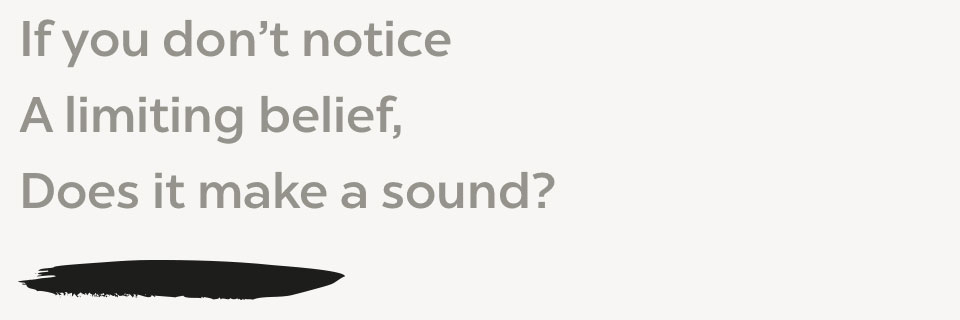Which is more dangerous: a chainsaw or a limiting belief about a chainsaw?
When I was too young to remember, my father rented a chainsaw to take out a large tree in our backyard. At one point, the chainsaw wound down after a cut and he lacerated the inside of his wrist–yeah, where the arteries are. He was terrified of course and rushed to the hospital.
Fortunately, the cut wasn’t deep enough to be life-threatening, but it was close. As often happens in families, the event became the basis of a shared belief: “Chainsaws are dangerous.”
Anytime we’d see someone with a chainsaw, walking through the neighborhood or driving down the road, everyone recited the verse: “Very dangerous.” I easily heard it 300 times before I turned eighteen.
When I use a chainsaw now (of which my parents disapprove), there’s a story playing like a radio station in my head: “Very dangerous.” Every few cuts, in my mind, I vividly see the scar on my father’s wrist. I hear his voice like he’s next to me. I hear him tell the story as we stand above the tree stump where it happened. “Don’t ever use a chainsaw,” he says, shaking his head, “Very dangerous.”
Is that really true, though?
Statistically, you’re more likely to hurt yourself driving than using a chainsaw, but I’m not wrestling with fear behind the wheel. Ironically, sometimes the story is so loud it distracts me from using the chainsaw–and that is dangerous!
What’s more dangerous than chainsaws? Conditioned, limiting beliefs: ideas messaged to us repeatedly before we could choose what to believe. These limiting beliefs play out in our lives often without us knowing.
Limiting Beliefs: A Root Cause of Suffering
“It’s not so much what folks don’t know that causes problems, it’s what they do know that ain’t so.” –Josh Billings
Your parents did the best they could. That’s true. What’s also true is they weren’t perfect. They surely taught you some things with the best of intentions that “just ain’t so.”
Do you know what they are?
If you don’t, those limiting beliefs are running your life.
The opportunity we have as free-thinking adults is to examine everything we swallowed whole and choose whether it remains a part of us.
Limiting beliefs inevitably limit you.
My father never used a chainsaw again. He can still be seen bow-sawing six-inch limbs for an hour, and hires out anything larger. He always was loyal.
Want to discover what limiting beliefs are holding you back from greatness? Now is the time to become a Clear and Open Member. Get started for a dollar. Use the coupon code ROCKAPRIL, between now and 12 am on 4/26.
The live course “Open to Excellence” begins in the weekly member webcasts on April 27, don’t miss it!


